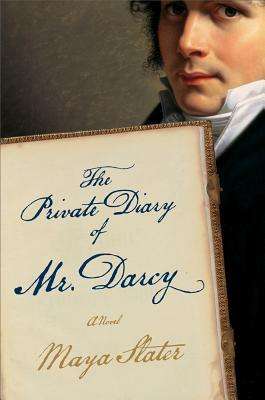The Private Diary of Mr. Darcy by Maya Slater
Jane Austen’s Pride & Prejudice holds a very special place in our household. It’s one of my daughter’s favorite books, and as a mom, if my daughter is going to fantasize over a love story, I’m not going to argue with a tale dating from 1813 about love overcoming perceptions and misunderstandings.
Therefore, when my local newspaper favorably featured Maya Slater’s book, I was intrigued. A little research turned up quite a few adaptations of Austen’s original story, including a Bollywood version, multiple vampire editions, and yes, another Mr. Darcy’s Diary (by Amanda Grange). While I can’t speak for these other efforts, I can say that The Private Diary of Mr. Darcy is very engaging, extremely entertaining, and feels absolutely authentic.
It is very easy to read; since it is a diary, there are not chapters but entries. That means that there is not a lot of long, flowing prose, but instead short, very intense snippets that nevertheless reveal much about Mr. Fitzwilliam Darcy – what is elaborated is what is important to the writer rather than a convention of fiction, and therefore what is elaborated is very telling.
This particular diary starts with the ball at Meryton where Darcy and the Bingleys first come in contact with the Bennets, and follows the same arc as Austen’s novel. However, as seen from Darcy’s point of view, rather than the focus immediately being dominated by the developing relationship between Elizabeth and Darcy, some of Austen’s less prominent story lines are embellished, such as Wickham’s “relationship” with young Georgiana, and the circumstances that lead Darcy to believe that Jane is not the modest young lady that she appears to be. We learn much more about Charles and Caroline Bingley, Darcy’s cousin Anne, and other characters that don’t even come into play in Pride & Prejudice, including, in a very interesting development, Darcy’s former schoolmate and friend Lord Byron. (The interaction of Darcy with his valet, Peebles, is, at turns, especially amusing and touching.)
Another interesting aspect to the use of a diary as literature is that we are given a glimpse into the daily activities of the British aristocracy of the time. I have often wondered just what these people did to fill their days in a society where so much was done for them. And Ms. Slater gives us that, as this diary was not just a journal of Darcy’s emotional musings, but also where he had gone, what he had done, with whom, and why. She has certainly done her research, and Darcy’s activities are a marvelous view of England at the turn of the last century. Its customs, mores and sensibilities (at least at Darcy’s level of nobility) are displayed without sentimentality or unnecessary exposition. Ms. Slater is also very conversant in Austen’s language, using a distinctive vocabulary with period grammar and spellings to keep us firmly rooted in Regency England – delicious.
And lest we forget, the world at this time was indeed a man’s world. The diary displays this with a frankness that would be expected from a personal journal not meant for public consumption. And, hold on to your bonnets, you romantics out there – it turns out that Mr. Darcy is no saint. He has few qualms in visiting bordellos, tumbling parlor maids, helping to set up Charles Bingley with a less than respectable young widow (to divert him from his feelings for Jane), and even is a party to some rather lecherous entertainments at the leisure of Lord Byron. Yet these activities are recounted rather dispassionately as would be expected of a journal, and there is no hint of any tawdry sensationalization of Austen’s novel. In fact, these private exploits make the diary feel quite authentic, in that Darcy becomes less a character in a romantic novel and more a human creature of his age.
If you have read Pride & Prejudice either voluntarily or under duress, or if you have been drawn into one of the many movies, plays or BBC productions of what surely is Jane Austen’s most accessible novel, and had any enjoyment from it, then I highly suggest that you read The Private Diary of Mr. Darcy. It’s a worthy soliloquy companion – in sense and sensibility – to one of the most beloved love stories of an age.
—Sharon Browning

